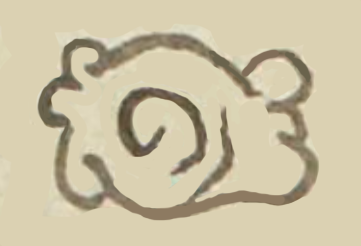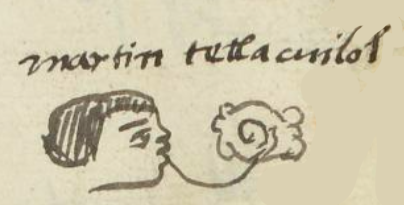Tetlacuilol (MH688r)
This black-line drawing of the compound glyph for the personal name (or occupational designation) Tetlacuilol may be short for a carved stone (tetlacuilolli). The name is attested here as male. It contains two merged elements. One is the stone (tetl), which is shown horizontally with curlicue ends.The other is a piece of writing or a design (what we are assuming to be tlacuilolli) in the form of a swirl.
Stephanie Wood
While tlacuilolli seems to refer to a document or a piece of writing, when the term is combined with stone, the emphasis seems to shift toward an emphasis on a design. Further research may help clarify this.
Marc Thouvenot identifies the verb icuiloa (or ihcuiloa, with the glottal stop), which means to paint, write, or print, as having a root of -cuil-. He notes how it also appears in tlacuiloliztli (writing), tlacuilo (writer), and cuicuiltic (mottled). He goes on to show various uses of icuiloa that take it beyond the simple definitions just given, resulting in something like the action of creating a design (e.g., on leather, ceramics, sculpture, or in textiles). It can also be something like the action of decorating (e.g., to put a flower on a cup of atole). He associates icuiloa and tlacuilolli with "cultural artifacts," such as arts and crafts or examples of writing and painting, but cuicuiltic with effects created by "nature." This short summary barely does his article justice; it is worth reading the entire piece. How Thouvenot's study might connect with the concept of bent or curved mentioned by Prem (1974: 555, 682) raises an interesting question. Perhaps the bent or curved lines of writing, painting, carving, embroidery, and so on, fall with in the realm of expressions of -cuil-. See
Marc Thouvenot, "Imágenes y escritura entre los nahuas del inicio del XVI," Estudios de Cultural Náhuatl 41 (2010).
Stephanie Wood
martin tetlacuilol
Martín Tetlacuilol
Stephanie Wood & Jeff Haskett-Wood
1560
Jeff Haskett-Wood
piedras talladas, diseños, escrituras, nombres de hombres

te(tl), stone, https://nahuatl.wired-humanities.org/content/tetl
tetlacuilo, sculptor, https://nahuatl.wired-humanities.org/content/tetlacuilo
tlacuilol(li), a piece of writing, a painting, or a design, https://nahuatl.wired-humanities.org/content/tlacuilolli
piedra tallada
Stephanie Wood
Matrícula de Huexotzinco, folio 688r, World Digital Library, https://www.loc.gov/resource/gdcwdl.wdl_15282/?sp=456&st=image.
This manuscript is hosted by the Library of Congress and the World Digital Library; used here with the Creative Commons, “Attribution-NonCommercial-ShareAlike 3.0 License” (CC-BY-NC-SAq 3.0).







